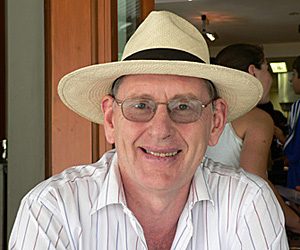Queensland’s crime watchdog asked to do a puppy’s job
It’s an abuse to use a body set up to investigate serious crime to probe a public service leak, Ross Fitzgerald writes.
During the Bjelke-Petersen era, Tony Fitzgerald, QC, saved Queensland from years of National Party corruption. Fitzgerald’s courage and personal sacrifice was an inspiration to a generation of Queenslanders who wanted honesty in public administration. He changed Queensland for the better.
The recommendations of Fitzgerald’s landmark report shook up the state, and rightly so. One of his key recommendations was the establishment of a corruption-fighting body now called the Crime and Misconduct Commission. It was a body designed to carry on his work and put the fear of God into corrupt police and politicians.
To do its job the CMC was given extraordinary powers to deal with organised crime and corruption. One of these powers, under section 75 of the Crime and Misconduct Act, allows the CMC to force witnesses to attend and give evidence before a ”star chamber”-style hearing at which witnesses are compelled to give evidence under oath. Failure to comply with the CMC directive is an offence which carries a year’s imprisonment.
A lawyer may be present with a witness but is unable to make representations or intervene in the CMC’s line of questioning. While the answers cannot be used by the CMC in any later court proceedings, any lie can result in a charge of perjury, which carries a penalty of seven years’ imprisonment.
These draconian star-chamber powers are a denial of natural justice but were designed to get to the heart of corruption and serious crime.
Now the Campbell Newman government is accusing the watchdog of wrongly injecting itself into the political arena and has announced an independent review of the CMC. A nasty case involving the former Bligh government may just prove that Newman is right and justify changes to the law. In 2010 and 2011 The Courier-Mail’s political reporter, Steven Wardill, published a series of stories from leaks within the Queensland government’s export arm, Trade and Investment Queensland. The leaked stories were an embarrassment to Anna Bligh and her state Labor government and in particular to Ian Fletcher, then director-general of the Department of Employment, Economic Development and Innovation, and his deputy, Mark Birmingham. Both men were responsible for the supervision of Trade and Investment Queensland.
The leaks covered such topics as the extension of the lease for the Los Angeles trade office; $10,000 worth of supposedly ”Buy Local” T-shirts made in Bangladesh and planned trade trips of Bligh government ministers, including the premier.
The most serious leak centred on whether Fletcher had misled a Queensland parliamentary estimates committee hearing on the timing of the renewal of the lease of the LA trade office. Opposition questioning had focused on why the lease had been renewed when the Queensland government had decided to move its commissioner and office to Latin America. As a result of a Wardill story, Fletcher was forced to correct his evidence before the committee.
In September 2011, an embarrassed Fletcher (who now heads a New Zealand intelligence agency) referred the leaks to the CMC for investigation. As a result of the Fletcher complaint the CMC had no choice but to consider the matter. For more than a year the investigation dragged public servants before the star chamber and demanded they answer questions.
Fletcher’s complaint was an extraordinary overreaction and has resulted in the crime-fighting powers of the CMC being used to investigate a public-service leak. The cost to taxpayers is not yet known but would run into tens of thousands of dollars.
The star-chamber powers of the CMC were never designed to drag public servants into a hearing to answer questions about leaks; they were designed for serious crime-fighting investigations.
Since Premier Newman’s large-scale sacking of public servants, there has been an avalanche of leaks published in The Courier-Mail and The Australian. If the CMC was to investigate all these leaks it wouldn’t have time to investigate corruption.
It has to be remembered that the Fitzgerald report strongly supported a free flow of information to the public. There has been no suggestion that the leaked information was incorrect. The Bligh government was simply concerned that it had become public and it was embarrassed as a result. To its credit, the Newman government is taking a much more mature approach and has not set about complaining to the CMC about leaks under the new administration.
Long-serving governments like the Bligh administration tend to try to control the free flow of information to the media and through them to the public, particularly when the issue is embarrassing.
The CMC for its part should have been much more astute and not have got involved in such public-service bastardry by referring the matter back to Fletcher. Fletcher in turn could have arranged for a departmental investigation or, more sensibly, put in place measures to prevent leaks. The current investigation has all the hallmarks of the CMC being manipulated by bureaucratic and government politics.
The CMC in Queensland should get back to using its star-chamber powers to target the real crooks and not terrorise public servants who have only been doing what public servants have done for generations. It should also have better supervision of how the powers under section 75 are used; they are clearly being inappropriately applied at the moment and not properly monitored. This is an issue in which the supervising parliamentary committee in Queensland’s single-house Parliament should take an interest and ask the CMC to explain itself.
It is to be hoped that current CMC chairman Ross Martin, who was appointed this year, will return the CMC’s focus to its core business and stop wasting time and money on such trivial investigations as public-service leaks.
Ross Fitzgerald is emeritus professor of history and politics at Griffith University and is the author of 35 books, most recently the political satire Fools’ Paradise.
The Canberra Times, October 15, 2012











Leave your response!